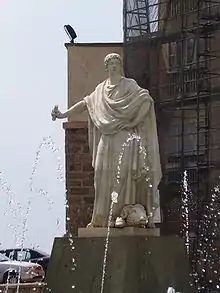Lucius Cornelius Balbus (proconsul)
Lucius Cornelius Balbus (fl. 1st century BC) was a Roman politician and general of Hispanian origin. Although from a family of naturalized foreigners (he received Roman citizenship at the same time as his uncle, around 72 BC) he did valuable services for the early Roman Empire and also contributed to public architecture of its capital.
Life
During the civil war, he served under Julius Caesar, by whom he was entrusted with several important missions. He also took part in the Alexandrian and Spanish wars. He was rewarded for his services by being admitted into the college of pontiffs. In 43 BC he was quaestor to Asinius Pollio in Further Spain (Hispania Ulterior), where he amassed a large fortune by plundering the inhabitants. Also, while there he added a suburb to his native town, Gades.[1]
In the same year, Lucius Cornelius Balbus crossed over to Bogud, King of Mauretania, and is not heard of again until 21 BC, when he appears as Proconsul of Africa. Mommsen thinks that he had incurred the displeasure of Augustus by his conduct as praetor, and that his African appointment after so many years was due to his exceptional fitness for the post.[1]
In 19 BC Balbus defeated the Garamantes (and did a famous expedition to Sub-Saharan Africa) and on March 27 in that year received the honor of a triumph, which was then for the first time granted to one who was not a Roman citizen by birth, and for the last time to a private individual, until the triumph of Belisarius in 534. He built a magnificent theatre at Rome, which was dedicated on the return of Augustus from Gaul in 13 BC.[2]
Balbus appears to have given some attention to literature. He wrote a play of which the subject was his visit to Lentulus in the camp of Pompey at Dyrrhachium, and, according to Macrobius,[3] was the author of a work called Ἐξηγητικά (Exegetica) dealing with the gods and their worship.[1]
Balbus expedition to sub-Saharan Africa
The first expedition done by Romans in the Sahara—according to Plinius—was the one of Cornelius Balbus[4] , who in 19 BC probably reached the Niger river near Timbuktu. He moved from the Libyan city of Sabratha and conquered the Garamantian capital in Fezzan with ten thousand legionaries and sent a small group of his legionaries further south across the Ahaggar mountains in order to explore the "land of the lions": they found a huge river (the Niger) that they determined was going toward the Nile river. Indeed, in 1955, many Roman coins and some Latin ceramics were found in the area of actual Mali.
According to Plinius this (Balbus) expedition started with the conquest of Gadames and later of Rapsa, actual Ghat. After the conquest of Garama and surrounding area, Plinius wrote that the Roman legionaries went further south to the Tassili mountains: the Legio III Augusta of Cornelius Balbus reached the oasis of Bistra in southern Algeria, and then reached Alasi (Abalessa in the Ahaggar) and Balsa (actual Ilezy), until some rivers then existing (but now disappeared) like the Dasibari river. According to the scholar Henri Lhote, Balbus probably used the old "road of carts", an old caravan route on the east side of the Bahr Attla, the "Atlantis sea", named even in the Bible. Along this road there are some stone inscription showing the Garamantes charriots. The Romans then crossed the Tamanrasset area on the actual border between Algeria and Niger, and reached the river Niger near actual Gao after crossing the caravan center of Tabemekka (in Mali).
— Jonathan Roth, San Jose State University
According to Jonathan Roth, some Roman coins have been recently discovered in the most northern region of Mali, confirming this expedition. Roman objects are, indeed, found in the Sahara, and, significantly, along the western caravan route: many Roman artifacts have been found at the Garamantian capital of Germa in the Fezzan.
Notes
- Chisholm 1911, Balbus.
- Chisholm 1911, Balbus cites Dio Cassius liv. 25; Pliny, Nat. Hist. xxxvi. 12. 60.
- Chisholm 1911, Balbus cites Saturnalia, iii. 6.
- Balbus expedition and successive expeditions, with map
References
 This article incorporates text from a publication now in the public domain: Chisholm, Hugh, ed. (1911). "Balbus". Encyclopædia Britannica (11th ed.). Cambridge University Press. which in turn cites:
This article incorporates text from a publication now in the public domain: Chisholm, Hugh, ed. (1911). "Balbus". Encyclopædia Britannica (11th ed.). Cambridge University Press. which in turn cites:
- Velleius Paterculus ii. 51; Cicero, ad Att. viii. 9
- Pauly-Wissowa, Realencyclopädie, iv. pt. i. (1900).
Further reading
- Anthon, Charles (1860). Smith, William (ed.). A New Classical Dictionary of Greek and Roman Biography, Mythology and Geography. New York: Harper & Brothers. p. 137.
